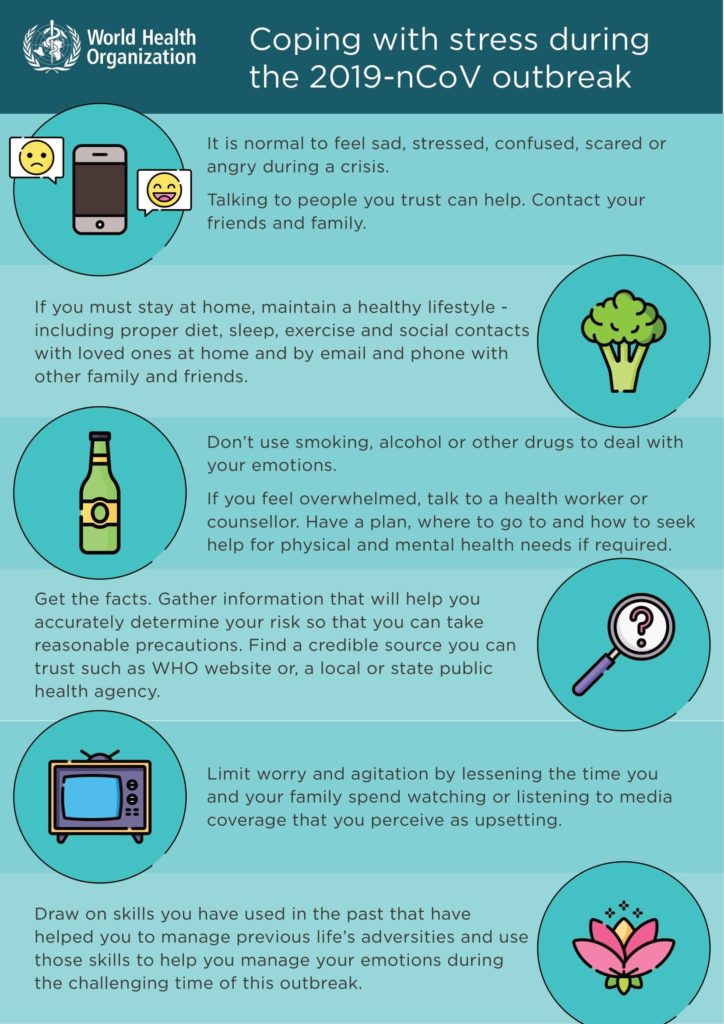
The global coronavirus outbreak has caused considerable concern among communities across the world. Nearly everyone has a friend or family member who falls into an ‘at risk’ category and who they are particularly worried about. Those who suffer from an underlying health condition may be even more worried about their health.
It can be easy for anyone to struggle to manage their anxiety levels when faced with such a swiftly-changing situation and it is natural to fear the unknown and to feel worried when we lack control over our lives.
But there are simple things we can do that may help, to stay mentally and physically well during these unsettling times, like avoiding news overload and believing everything you read on social media that comes from anything but the real experts.

Another way of coping with the stress of the coming months of uncertainty, is by embracing the Five Ways to Well-Being, developed by the New Economics Foundation.
The Five Ways provide five key steps that you can take as your mental ‘five-a-day’ to contribute to your overall well-being and during this unprecedented time, they may provide something to help you cope:
• Connect – even if you can’t physically be with your friends and loved ones, connect with them via phone, email, Skype, Facetime – whatever way you choose.
• Be Active – exercise may be limited at the moment, but it makes us feel good and we can still go for a walk – while keeping a distance of two metres – between yourself and other people; make your home your gym by following an online video or make up a circuit of exercise in your garden.
• Take Notice – this tip advocates stopping and pausing or take a moment to look around you now and take notice of the beautiful, new, unusual or extraordinary things in your everyday life. Even if your options are limited at the moment, there’ll be something to notice.
• Keep Learning – these troubling times might be the perfect opportunity for you to learn a new thing, while you’re prevented from carrying on your day-to-day routine. You can access countless ‘how to’ videos online these days so why not learn a new craft or hobby, a new instrument or even a new language.
• Give – The opportunity to give to others may be limited at the moment however, you could help an elderly neighbour in self-isolation by buying them groceries or offering to walk their dog, while still following the official hygiene advice on preventing the spread of Covid-19.
The National Health Service has also published tips to help you cope with the consequences of the pandemic:
If you are feeling concerned or overly worried there are some techniques you can use to help manage your anxiety such as simple breathing or (short-term) distraction exercises and mindfulness. A free guide is available to download from the organisation, Anxiety UK (https://www.anxietyuk.org.uk/products/booklet/breathing-and-relaxation-guide/);
Try practising the APPLE technique which encourages you to Acknowledge, Pause, Pull back, Let go and Explore…
Acknowledge – Notice and acknowledge the uncertainty as it comes to mind.
Pause – Don’t react as you normally do. Don’t react at all. Just pause and breath.
Pull back – Tell yourself this is just the worry talking, and this apparent need for certainty is not helpful and not necessary. It is only a thought or feeling. Don’t believe everything you think. Thoughts are not statements or facts.
Let go – Let go of the thought or feeling. It will pass. You don’t have to respond to them. You might imagine them floating away in a bubble or cloud.
Explore – Explore the present moment, because right now, in this moment, all is well. Notice your breathing and the sensations of your breathing. Notice the ground beneath you. Look around and notice what you see, what you hear, what you can touch, what you can smell. Right now. Then shift your focus of attention to something else – on what you need to do, on what you were doing before you noticed the worry, or do something else – mindfully with your full attention.
Further resources
Anxiety UK https://www.anxietyuk.org.uk/products/anxiety-condition/health-anxiety/health-anxiety-fact-sheet-instant-download/ Contact Anxiety UK by email ([email protected]) or by calling the helpline on 03444 775 774 between the opening hours of 9.30am – Public Health Agency’s Minding Your Head service at https://www.mindingyourhead.info/
Mental Health Foundation – https://www.mentalhealth.org.uk/
Aware NI are also offering online support groups – https://www.aware-ni.org/how-we-can-help-you/aware-ni-online-support-groups.
URGENT HELP
Samaritans – 116 123
Lifeline – 0808 808 8000
Childline – 0800 1111